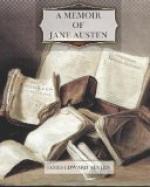Since that time, the testimonies in favour of Jane Austen’s works have been continual and almost unanimous. They are frequently referred to as models; nor have they lost their first distinction of being especially acceptable to minds of the highest order. I shall indulge myself by collecting into the next chapter instances of the homage paid to her by such persons.
CHAPTER IX.
Opinions expressed by eminent persons—Opinions of others of less eminence—Opinion of American readers.
Into this list of the admirers of my Aunt’s works, I admit those only whose eminence will be universally acknowledged. No doubt the number might have been increased.
Southey, in a letter to Sir Egerton Brydges, says: ’You mention Miss Austen. Her novels are more true to nature, and have, for my sympathies, passages of finer feeling than any others of this age. She was a person of whom I have heard so well and think so highly, that I regret not having had an opportunity of testifying to her the respect which I felt for her.’
It may be observed that Southey had probably heard from his own family connections of the charm of her private character. A friend of hers, the daughter of Mr. Bigge Wither, of Manydown Park near Basingstoke, was married to Southey’s uncle, the Rev. Herbert Hill, who had been useful to his nephew in many ways, and especially in supplying him with the means of attaining his extensive knowledge of Spanish and Portuguese literature. Mr. Hill had been Chaplain to the British Factory at Lisbon, where Southey visited him and had the use of a library in those languages which his uncle had collected. Southey himself continually mentions his uncle Hill in terms of respect and gratitude.
S. T. Coleridge would sometimes burst out into high encomiums of Miss Austen’s novels as being, ’in their way, perfectly genuine and individual productions.’
I remember Miss Mitford’s saying to me: ’I would almost cut off one of my hands, if it would enable me to write like your aunt with the other.’
The biographer of Sir J. Mackintosh says: ’Something recalled to his mind the traits of character which are so delicately touched in Miss Austen’s novels . . . He said that there was genius in sketching out that new kind of novel . . . He was vexed for the credit of the “Edinburgh Review” that it had left her unnoticed .{145} . . The “Quarterly” had done her more justice . . . It was impossible for a foreigner to understand fully the merit of her works. Madame de Stael, to whom he had recommended one of her novels, found no interest in it; and in her note to him in reply said it was “vulgaire”: and yet, he said, nothing could be more true than what he wrote in answer: “There is no book which that word would so little suit.” . . . Every village could furnish matter for a novel to Miss Austen. She did not need the common materials for a novel, strong emotions, or strong incidents.’ {146}




